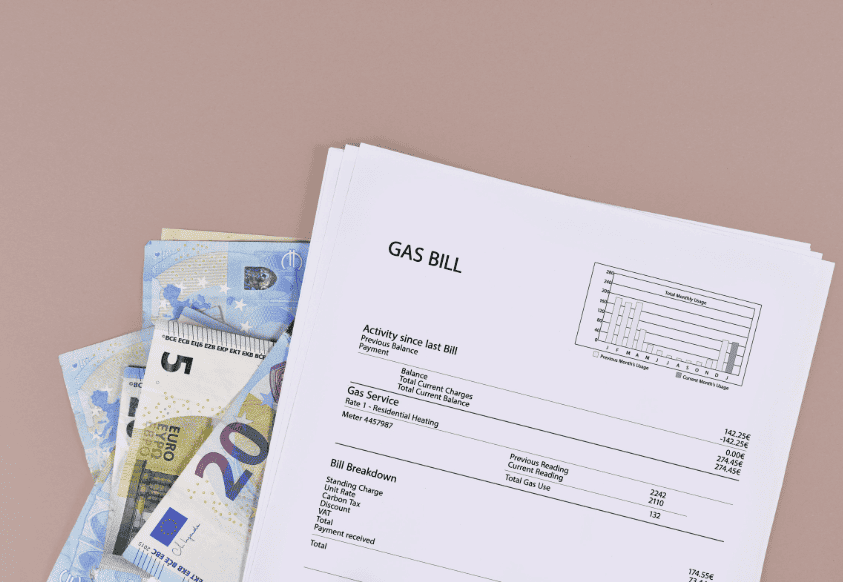Gas bills can often be a significant expense in our monthly budgets, especially during the colder months when heating becomes a necessity. However, there are several strategies you can employ to ensure that you’re getting the best possible deal on your gas bills.
Table of Contents
From making energy-efficient changes to your home to exploring alternative energy sources, this article will delve into key approaches to help you save money and reduce your carbon footprint.
1. Embrace Energy-Efficient Practices
One of the most effective ways to trim your gas bills is by adopting energy-efficient practices within your home. Start by improving your home’s insulation. Properly insulated walls, floors, and attics can significantly reduce heat loss, meaning you’ll need less energy to keep your home warm.
Additionally, consider upgrading to double-glazed windows, which can further contribute to maintaining a consistent indoor temperature and minimizing the need for excessive heating.

Beyond insulation, upgrading to energy-efficient appliances can make a substantial difference. Replace older gas stoves, ovens, and water heaters with newer models that have higher energy efficiency ratings.
Regular maintenance, such as cleaning or replacing furnace filters, can also optimize your heating system’s performance, ensuring it operates at its peak efficiency. Finally, consider installing a programmable thermostat to regulate your home’s temperature based on your schedule, preventing unnecessary energy consumption when you’re not at home or during sleeping hours.
2. Compare Energy Suppliers and Plans
While it’s easy to stick with the same energy supplier out of convenience, taking the time to compare different suppliers and plans can yield significant savings.
As seen at Electricity Monster, any regions have a variety of gas providers, each offering different rates and incentives. Use online comparison tools or contact local providers to gather information about their pricing structures, contract terms, and any special offers available.
Keep an eye out for fixed-rate plans, which can provide stability by locking in a consistent rate for a certain period, shielding you from fluctuating gas prices. Variable-rate plans, on the other hand, may initially offer lower rates but can expose you to potential price hikes in the future.
Assess your consumption patterns and financial preferences to determine which plan aligns best with your needs. Don’t hesitate to negotiate with potential providers to secure better deals or ask about loyalty rewards programs that could further reduce your gas expenses.
3. Explore Renewable Energy Alternatives
As environmental concerns grow, more homeowners are exploring renewable energy alternatives, and this extends to gas usage as well.
Consider researching and investing in renewable natural gas (RNG), which is produced from organic waste sources like landfills, wastewater treatment plants, and agricultural operations. RNG has a lower carbon footprint compared to traditional natural gas and can be used seamlessly with existing gas infrastructure.
Furthermore, solar water heating systems can significantly reduce your gas bill by utilizing the sun’s energy to heat your home’s water supply. While the upfront costs of these systems can be high, the long-term savings and environmental benefits can make them a worthwhile investment.
Additionally, investigate any government incentives or tax credits available for adopting renewable energy sources, as these can further offset the initial expenses.
4. Implement Smart Usage Habits
In addition to making physical changes to your home and exploring alternative energy sources, your everyday habits can also play a crucial role in reducing your gas bills. Take advantage of natural sunlight by opening curtains and blinds during the day to naturally warm up your living spaces.
Conversely, close them at night to retain heat and prevent drafts. Opt for warmer clothing and blankets before turning up the thermostat, and encourage family members to do the same.
Cooking and cleaning can also impact your gas bills. Use lids on pots and pans while cooking to retain heat and reduce cooking times. When doing laundry, try to run full loads and use cold water whenever possible. Similarly, consider taking shorter showers to minimize hot water usage. These seemingly small adjustments can collectively contribute to noticeable savings over time.
5. Monitor and Adjust
Once you’ve implemented these strategies, it’s essential to monitor your gas consumption and bills regularly. Keep track of your usage patterns and compare them to previous months to identify any unexpected spikes.
If you notice significant deviations, investigate the cause and take corrective measures as needed. This proactive approach will not only help you catch and address any issues promptly but also allow you to assess the effectiveness of your energy-saving efforts.

6. Seek Professional Energy Audits
If you’re serious about maximizing your gas bill savings, consider arranging for a professional energy audit of your home. Certified energy auditors can conduct comprehensive assessments of your home’s energy usage, identifying areas of improvement and recommending tailored solutions.
These audits often reveal hidden sources of energy waste, such as air leaks, inefficient appliances, or inadequate insulation. Armed with this information, you can make well-informed decisions on how to prioritize energy-efficient upgrades and investments, ensuring you get the most bang for your buck.
7. Engage in Community Initiatives
Community initiatives focused on energy conservation and sustainability can also contribute to lowering your gas bills. Join local groups or forums where residents share tips, experiences, and resources related to reducing energy consumption.
Engaging in such communities can provide you with valuable insights and creative ideas that you may not have considered. Additionally, some communities may organize bulk-buying programs for energy-efficient appliances or offer discounts on renewable energy installations through collective purchasing power.
By actively participating in these initiatives, you not only save money but also contribute to a stronger, more sustainable local community.
8. Optimize Your Home’s Landscaping
Believe it or not, your home’s landscaping can also influence your gas bills. Planting trees strategically around your home can provide natural shade during hot months, reducing the need for excessive cooling.
Similarly, during colder months, these trees can act as windbreaks, shielding your home from cold drafts and helping to maintain a warmer indoor temperature. Well-placed shrubs and hedges can also provide insulation, creating a barrier against heat loss from the ground. By carefully planning and maintaining your outdoor spaces, you can create an energy-efficient buffer that contributes to overall gas bill reduction.
9. Stay Informed and Adapt
As technology and energy-saving practices continue to evolve, it’s essential to stay informed about new developments and opportunities to reduce your gas bills. Regularly check for updates on energy-efficient appliances, government incentives, and emerging renewable energy technologies.
By remaining open to change and adapting your strategies as new options become available, you can continuously improve your energy efficiency and secure even better deals on your gas bills. Remember, the effort you invest in optimizing your energy usage not only benefits your wallet but also contributes to a more sustainable future for our planet.
Taking control of your gas bills involves a combination of energy-efficient home improvements, strategic selection of energy suppliers and plans, exploring renewable energy options, implementing smart usage habits, vigilant monitoring, seeking professional energy audits, engaging in community initiatives, and optimizing your home’s landscaping.
By following these comprehensive steps, you can secure a good deal on your gas bills, promote environmental responsibility, and contribute to a more sustainable future for yourself and generations to come. With dedication and a holistic approach, you can achieve substantial savings while making a positive impact on both your finances and the planet.
Frequently Asked Questions
1. How much can I save by implementing energy-efficient practices?
The amount you can save varies depending on factors such as your current energy consumption, the extent of the changes you make, and local energy prices. However, studies suggest that adopting energy-efficient practices can lead to savings of up to 20-30% on your gas bills. Over time, these savings can add up significantly, making your investment in energy-efficient upgrades well worth it.
2. Are renewable energy alternatives practical for reducing gas bills?
Yes, renewable energy alternatives like renewable natural gas (RNG) and solar water heating can be practical options for reducing your gas bills. While the initial costs may be higher, the long-term savings and environmental benefits can make these investments worthwhile. Additionally, government incentives, tax credits, and rebates can further offset the upfront expenses, making renewable energy alternatives even more appealing.
3. How can I determine if I need a professional energy audit?
If you’re committed to maximizing your energy savings and reducing your gas bills, a professional energy audit can provide valuable insights. Consider scheduling an audit if you’ve noticed significant fluctuations in your energy bills, have an older home with potential insulation issues, or if you’re planning extensive renovations. An energy audit can pinpoint areas for improvement and help you prioritize upgrades based on your specific needs and budget.
4. How can community initiatives help lower my gas bills?
Engaging in community initiatives can help you access valuable information and resources that contribute to lower gas bills. Local groups and forums often provide tips and ideas for energy-saving practices that you might not have considered. Additionally, bulk-buying programs or collective purchasing power for energy-efficient appliances and renewable energy installations can lead to cost savings for participants, further reducing gas expenses.
5. Is landscaping really important for energy efficiency?
Yes, landscaping can play a significant role in energy efficiency. Properly placed trees, shrubs, and hedges can provide natural shade, insulation, and windbreaks, helping to regulate your home’s temperature and reduce the need for excessive heating and cooling. Thoughtful landscaping can contribute to a more energy-efficient and comfortable living environment, ultimately impacting your gas bills positively.
Remember that each individual’s situation is unique, so it’s a good idea to assess your specific needs and circumstances when implementing these strategies to get the best results. If you have further questions or require more personalized advice, don’t hesitate to consult with energy professionals or local experts in your area.



